含if的真实条件句和虚拟条件句
if主从句的三个原则

if主从句的三个原则if主从句是英语语法中一种常见的条件句,也是英语学习中一个重要的语法点。
学习if主从句需要遵循三个原则,下面就来具体解析一下。
第一个原则:真实条件句真实条件句一般表示可能实现的条件,它的主句和从句都采用陈述语气(know,come等)。
例如:如果我有空的话,明天就去看电影。
(If I have time, I will go to see a movie tomorrow.)这句话表示的是,如果我有空的话,我会去看电影。
这个条件存在,我也真的可能会去看电影。
因此,这个条件句应该使用真实条件句。
第二个原则:虚拟条件句虚拟条件句一般表示不可能或不实现的条件。
它分为三种类型:1.虚拟条件句的现在时,它的主句用将来时(will, shall等),从句用一般过去时(were + Ving)。
例如:如果我有钱,我就会买一只荷包蛋。
(If I had money, I would buy an egg.)这句话表示的是,我现在没有钱,所以我不可能买荷包蛋。
因此,这个条件句应该使用虚拟条件句的现在时。
2.虚拟条件句的过去时,它的主句用过去时(was, had, would等),从句用过去完成时(were + Ving)。
例如:如果我当时会开车,我就不会迟到了。
(If I had known how to drive then, I wouldn't have been late.)这句话表示的是,我当时不会开车,所以我迟到了。
因此,这个条件句应该使用虚拟条件句的过去时。
3.虚拟条件句的将来时,它的主句用过去式(would, should等),从句用过去完成时(were + Ving)。
例如:如果你爸爸不忙的话,他就会来的。
(If your father were not busy, he would come.)这句话表示的是,你爸爸现在忙,所以他不可能来。
因此,这个条件句应该使用虚拟条件句的将来时。
if引导的虚拟条件句
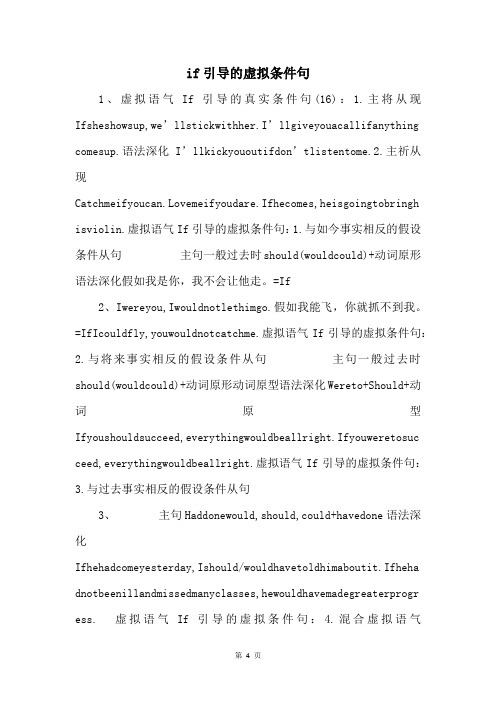
if引导的虚拟条件句1、虚拟语气If引导的真实条件句(16):1.主将从现Ifsheshowsup,we’llstickwithher.I’llgiveyouacallifanything comesup.语法深化I’llkickyououtifdon’tlistentome.2.主祈从现Catchmeifyoucan.Lovemeifyoudare.Ifhecomes,heisgoingtobringh isviolin.虚拟语气If引导的虚拟条件句:1.与如今事实相反的假设条件从句主句一般过去时should(wouldcould)+动词原形语法深化假如我是你,我不会让他走。
=If2、Iwereyou,Iwouldnotlethimgo.假如我能飞,你就抓不到我。
=IfIcouldfly,youwouldnotcatchme.虚拟语气If引导的虚拟条件句:2.与将来事实相反的假设条件从句主句一般过去时should(wouldcould)+动词原形动词原型语法深化Wereto+Should+动词原型Ifyoushouldsucceed,everythingwouldbeallright.Ifyouweretosuc ceed,everythingwouldbeallright.虚拟语气If引导的虚拟条件句:3.与过去事实相反的假设条件从句3、主句Haddonewould,should,could+havedone语法深化Ifhehadcomeyesterday,Ishould/wouldhavetoldhimaboutit.Ifheha dnotbeenillandmissedmanyclasses,hewouldhavemadegreaterprogr ess.虚拟语气If引导的虚拟条件句:4.混合虚拟语气Ifyou_______himyesterday,you______whattodonow.(ask,know)语法深化〔从句与过去事实相反,主句与如今事实相反。
if引导的条件状语从句总结(精)
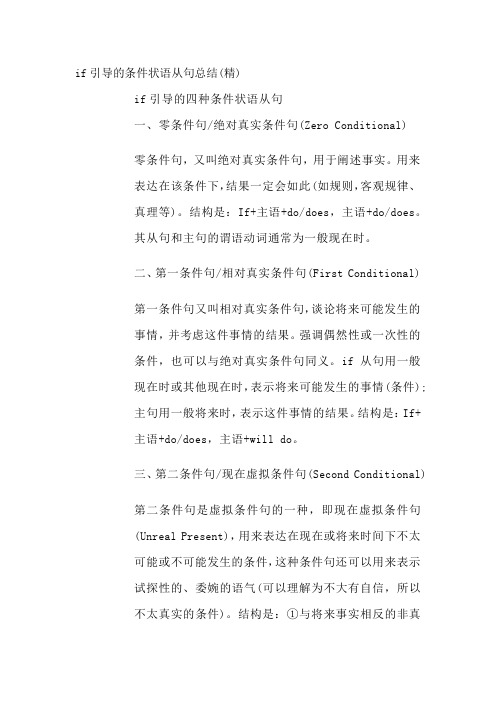
if引导的条件状语从句总结(精)if引导的四种条件状语从句一、零条件句/绝对真实条件句(Zero Conditional)零条件句,又叫绝对真实条件句,用于阐述事实。
用来表达在该条件下,结果一定会如此(如规则,客观规律、真理等)。
结构是:If+主语+do/does,主语+do/does。
其从句和主句的谓语动词通常为一般现在时。
二、第一条件句/相对真实条件句(First Conditional)第一条件句又叫相对真实条件句,谈论将来可能发生的事情,并考虑这件事情的结果。
强调偶然性或一次性的条件,也可以与绝对真实条件句同义。
if从句用一般现在时或其他现在时,表示将来可能发生的事情(条件);主句用一般将来时,表示这件事情的结果。
结构是:If+主语+do/does,主语+will do。
三、第二条件句/现在虚拟条件句(Second Conditional)第二条件句是虚拟条件句的一种,即现在虚拟条件句(Unreal Present),用来表达在现在或将来时间下不太可能或不可能发生的条件,这种条件句还可以用来表示试探性的、委婉的语气(可以理解为不大有自信,所以不太真实的条件)。
结构是:①与将来事实相反的非真实条件句是If+主语+should do/were to do/did,主语+would/should/could/might do;②与现在事实相反的非真实条件句是If+主语+did,主语+would/should/could/might+do。
四、第三条件句/过去虚拟条件句(Third Conditional) 第三条件句是表示与过去事实相反的虚拟语气,是用来表达如果(If)当时那样发生,另外一方面(当时)结果会如何。
通常是指过去的事情,带有一切已经太迟而不能够补救的意思。
结构是:If+主语+had done,主语+would/should/could/ might+have done。
if 条件句的时态搭配1.if从句用一般现在时,主句用一般将来时2.if从句用一般现在时,主句用may/might/canIf the fog gets thicker the plane may/might be diverted.3.if从句用一般现在时,主句用must/shouldIf you want to lose weight you must/should eat less bread.4.if从句用一般现在时,主句用一般现在时5.if从句用现在进行时,主句用一般将来时6.if从句用现在完成时,主句用一般将来时If you have finished dinner I’ll ask the waiter for the bill.。
if引导的条件句中的虚拟语气
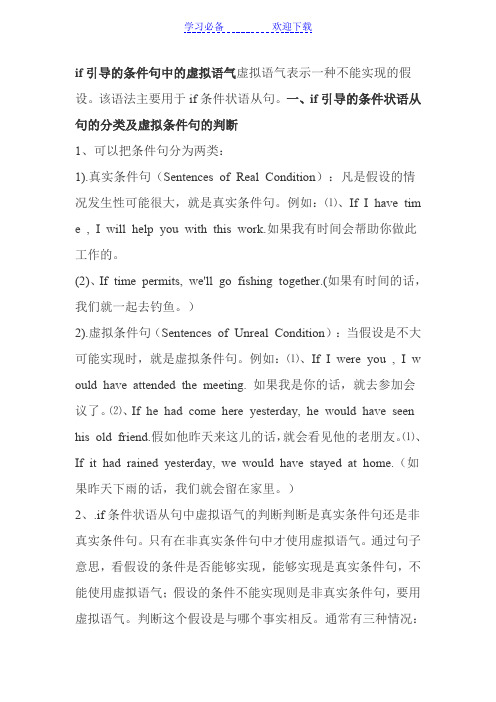
if引导的条件句中的虚拟语气虚拟语气表示一种不能实现的假设。
该语法主要用于if条件状语从句。
一、if引导的条件状语从句的分类及虚拟条件句的判断1、可以把条件句分为两类:1).真实条件句(Sentences of Real Condition):凡是假设的情况发生性可能很大,就是真实条件句。
例如:⑴、If I have tim e , I will help you with this work.如果我有时间会帮助你做此工作的。
(2)、If time permits, we'll go fishing together.(如果有时间的话,我们就一起去钓鱼。
)2).虚拟条件句(Sentences of Unreal Condition):当假设是不大可能实现时,就是虚拟条件句。
例如:⑴、If I were you , I w ould have attended the meeting. 如果我是你的话,就去参加会议了。
⑵、If he had come here yesterday, he would have seen his old friend.假如他昨天来这儿的话,就会看见他的老朋友。
⑴、If it had rained yesterday, we would have stayed at home.(如果昨天下雨的话,我们就会留在家里。
)2、.if条件状语从句中虚拟语气的判断判断是真实条件句还是非真实条件句。
只有在非真实条件句中才使用虚拟语气。
通过句子意思,看假设的条件是否能够实现,能够实现是真实条件句,不能使用虚拟语气;假设的条件不能实现则是非真实条件句,要用虚拟语气。
判断这个假设是与哪个事实相反。
通常有三种情况:①与过去事实相反。
②与现在事实相反。
③与将来事实可能相反。
3、“后退一步法”后退一步法是指在准确地判断了该句与哪一事实相反后,按虚拟语气的后退一步法处理从句谓语动词的时态。
if条件句

if条件句
if条件句是一类英语句型,用于表达条件和假设。
其基本结构为
“If + 条件句子,主句”。
其中,条件句子通常采用现在时、过去时或虚拟语气的形式,主句则是表示结果的句子。
if条件句通常分为四种类型:
1.真实条件句(Real Conditional Sentences):表示可能发生的情况,条件句子使用现在时态,主句使用将来时态。
例句:If it rains tomorrow, I will stay at home.
如果明天下雨,我会呆在家里。
2.虚拟条件句(Unreal Conditional Sentences):表示假设或不可能实现的情况,条件句子使用虚拟语气,主句使用过去时态。
例句:If I had a million dollars, I would buy a house in the countryside.
如果我有一百万美元,我会在郊区买房子。
3.第二种虚拟条件句(Second Conditional Sentences):表示目前不可能实现的情况,条件句子使用虚拟语气,主句使用现在时态。
例句:If I were you, I would quit that job.
如果我是你,我会辞掉那份工作。
4.混合虚拟条件句(Mixed Conditional Sentences):表示对过去的事情进行虚拟推论,条件句子使用过去时态,主句使用现在完成时态。
例句:If he had studied harder, he would have passed the exam.
如果他学得更努力些,他就能通过考试了。
if 条件状语从句中的虚拟语气

1.if 条件状语从句中的虚拟语气一、if 条件状语从句中表示对将来、过去、现在的虚拟1. If she invites me tomorrow, I shall go to the party.(真实条件句)如果她明天邀请我参加聚会,我就去.If she invited me , I should go to the party.[虚拟条件句] (说话人认为邀请的可能性较小或不可能)She will probably not invite me, so I shall not go to the party.2. If she had invited me yesterday, I should have gone to the party.假如她昨天邀请我参加聚会,我就去了.She didn`t invite me yesterday, so I didn`t go to the party. 她昨天没有邀请我参加聚会,因此我没有去.3. If she should invite me tomorrow, I should go to the party.If she were to invite me tomorrow, I should go to the party.If she invited me tomorrow, I should go to the party.1.对现在的虚拟条件状语从句的动词形式主句的动词形式If+主语+动词过去式(be的过去式用were) I (we) should+动词原形主语+would(might, could)+动词原形If I were you, I should study English. (I am not you , so I shall not study English.)If I had time, I would attend the wedding. (I does not have time, so I will not attend the wedding.)If they didn`t take physical exercises every day, they wouldn`t be so healthy.(They take physical exercises every day, so they are very healthy.)2.对过去的虚拟条件状语从句的动词形式主句的动词形式If+主语+had+过去分词 I(we) should+ have+过去分词主语+would(might, could)+have+过去分词If you had taken my advice, you wouldn`t have failed in theexamination.(You did not take my advice, so you have failed in the examination.)3.对将来的虚拟条件状语从句的动词形式(三种) 主句的动词形式⑴If+主语+动词过去式(be的过去式用were),通常要与一个表示将来的时间状语连用(tomorrow)⑵If+主语(任何人称和数)+should+动词原形⑶If+主语(任何人称和数) +were +to动词原形I (we) should+动词原形或主语(任何人称)+would(might, could)+动词原形If it rained tomorrow, our picnic would be put off.If it should rain tomorrow, our picnic would be put off. If it were to rain tomorrow, our picnic would be put off.。
现在时态If真实条件句与虚拟条件句
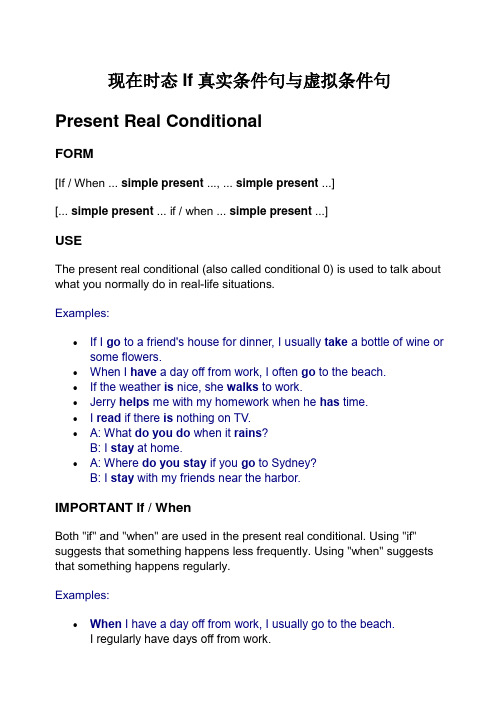
现在时态If真实条件句与虚拟条件句Present Real ConditionalFORM[If / When ... simple present ..., ... simple present ...][... simple present ... if / when ... simple present ...]USEThe present real conditional (also called conditional 0) is used to talk about what you normally do in real-life situations.Examples:•If I go to a friend's house for dinner, I usually take a bottle of wine or some flowers.•When I have a day off from work, I often go to the beach.•If the weather is nice, she walks to work.•Jerry helps me with my homework when he has time.•I read if there is nothing on TV.•A: What do you do when it rains?B: I stay at home.•A: Where do you stay if you go to Sydney?B: I stay with my friends near the harbor.IMPORTANT If / WhenBoth "if" and "when" are used in the present real conditional. Using "if" suggests that something happens less frequently. Using "when" suggests that something happens regularly.Examples:•When I have a day off from work, I usually go to the beach.I regularly have days off from work.•If I have a day off from work, I usually go to the beach.I rarely have days off from work.Present Unreal ConditionalFORM[If ... simple past ..., ... would + verb ...][... would + verb ... if ... simple past ...]USEThe present unreal conditional (also called conditional 2) is used to talk about what you would generally do in imaginary situations.Examples:•If I owned a car, I would drive to work. But I don't own a car.•She would travel around the world if she had more money. But she doesn't have much money.•I would read more if I didn't watch so much TV.•Mary would move to Japan if she spoke Japanese.•If they worked harder, they would earn more money.•A: What would you do if you won the lottery?B: I would buy a house.•A: Where would you live if you moved to the U.S.?B: I would live in Seattle.EXCEPTION If I were ...In the present unreal conditional, the form "was" is not considered grammatically correct. In written English or in testing situations, you should always use "were." However, in everyday conversation, "was" is often used. Examples:•If he were French, he would live in Paris.•If she were rich, she would buy a yacht.•I would play basketball if I were taller.•I would buy that computer if it were cheaper.•I would buy that computer if it was cheaper.Not Correct(But often said in conversation.)IMPORTANT Only use "If"Only the word "if" is used with the present unreal conditional because you are discussing imaginary situations. "When" cannot be used.Examples:•I would buy that computer when it were cheaper.Not Correct•I would buy that computer if it were cheaper.Correct EXCEPTION Conditional with Modal VerbsThere are some special conditional forms for modal verbs in English: would + can = couldwould + shall = shouldwould + may = mightThe words "can," "shall" and "may" cannot be used with "would." Instead, they must be used in these special forms.Examples:•If I went to Egypt, I would can learn Arabic.Not Correct•If I went to Egypt, I could learn Arabic.Correct•If she had time, she would may go to the party.Not Correct•If she had time, she might go to the party.CorrectThe words "could," should," "might" and "ought to" include conditional, so you cannot combine them with "would."Examples:•If I had more time, I would could exercise after work.Not Correct •If I had more time, I could exercise after work.Correct•If he invited you, you really would should go.Not Correct•If he invited you, you really should go.Correct。
if的条件句的三种用法

千里之行,始于足下。
if的条件句的三种用法条件句在英语中是非经常见的一种句型,用于表达假设、可能性和条件关系。
if(假如)是条件句的引导词,它可以有不同的用法和用途。
下面将具体介绍if条件句的三种常见用法。
1. 条件虚拟语气条件虚拟语气用于表示假设、与事实相反的状况或不行能的状况。
它包括三种类型:与现在事实相反、与过去事实相反和与将来事实相反。
与现在事实相反:这种类型的条件句用于描述与现实状况相反或与过去和现在的条件不全都的状况。
它的结构是:“if + 过去完成时,主语 + would/could/might + 动词原形”。
例如:- If I had studied harder, I would have passed the exam.(假如我学习更努力点,我就会通过考试了。
)- If she had told me earlier, I could have helped her.(假如她早点告知我,我原来可以挂念她的。
)与过去事实相反:这种类型的条件句用于描述与过去事实相反的状况。
它的结构是:“if + 过去完成时,主语 + would/could/might + have + 过去分词”。
例如:- If I had known he was sick, I would have visited him.(假如我知道他病了,我原来会去探望他的。
)第1页/共3页锲而不舍,金石可镂。
- If the weather had been better, we might have gone to the beach.(假如天气好些的话,我们或许会去海滩的。
)与将来事实相反:这种类型的条件句用于描述与将来事实相反的状况。
它的结构是:“if + 过去完成时,主语 + would/could/might + 动词原形”。
例如:- If I had more money, I would travel around the world.(假如我有更多的钱,我就会周游世界。
if引导的条件句 与 虚拟语气 的 区别

if引导的条件句与虚拟语气的区别if引导的从句什么时候用虚拟语气最佳答案if引导的条件状语从句的分类及虚拟条件句的判断1、可以把条件句分为两类:1).真实条件句(Sentences of Real Condition):凡是假设的情况发生性可能很大,就是真实条件句。
例如:⑴、If I have time , I will help you with this work.如果我有时间会帮助你做此工作的。
⑵、As long as I say anything wrong, you must point it out.只要我说了什么错话,你一定要指出来。
⑶、If time permits, we'll go fishing together.(如果有时间的话,我们就一起去钓鱼。
)2).虚拟条件句(Sentences of Unreal Condition):当假设是不大可能实现时,就是虚拟条件句。
例如:⑴、If I were you , I would have attended the meeting. 如果我是你的话,就去参加会议了。
⑵、If he had come here yesterday, he would have seen his old friend.假如他昨天来这儿的话,就会看见他的老朋友。
⑴、If it had rained yesterday, we would have stayed at home.(如果昨天下雨的话,我们就会留在家里。
)2、.if条件状语从句中虚拟语气的判断判断是真实条件句还是非真实条件句。
只有在非真实条件句中才使用虚拟语气。
通过句子意思,看假设的条件是否能够实现,能够实现是真实条件句,不能使用虚拟语气;假设的条件不能实现则是非真实条件句,要用虚拟语气。
判断这个假设是与哪个事实相反。
通常有三种情况:①与过去事实相反。
②与现在事实相反。
③与将来事实可能相反。
If条件句和虚拟语气
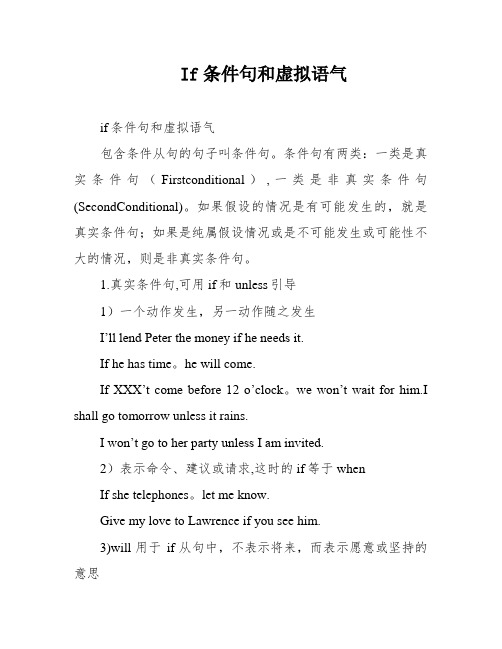
If条件句和虚拟语气if条件句和虚拟语气包含条件从句的句子叫条件句。
条件句有两类:一类是真实条件句(Firstconditional),一类是非真实条件句(SecondConditional)。
如果假设的情况是有可能发生的,就是真实条件句;如果是纯属假设情况或是不可能发生或可能性不大的情况,则是非真实条件句。
1.真实条件句,可用if和unless引导1)一个动作发生,另一动作随之发生I’ll lend Peter the money if he needs it.If he has time。
he will come.If XXX’t come before 12 o’clock。
we won’t wait for him.I shall go tomorrow unless it rains.I won’t go to her party unless I am invited.2)表示命令、建议或请求,这时的if等于whenIf she telephones。
let me know.Give my love to Lawrence if you see him.3)will用于if从句中,不表示将来,而表示愿意或坚持的意思If you will come this way。
I’ll take you to the manager’s office.If you will get drunk every night。
it’s not surprising you XXX.非真实条件句非实在前提句包孕虚拟前提句和错综工夫前提句1)虚拟条件句分三类,其结构列表如下:与现在事实相反与过去事实相反与未来究竟相反条件从句结果主句If+主语+动词的普通过去主语+would/could/might时(be动词普通用were)+动词原形If+主语+had+过去分词主语+would/could/might+have +过去分词If+主语+普通过去时主语+would/should/could/might+If+主语+were to动词原形。
If条件句

3.与过去事实相反的虚拟条件句 构成 条件状语从句 主句
If + 主语 + 动词过去完成 主语+ would, should, could, might+ have + 式 过去分词
例如 If there had been no air in the tube, the result would have been better.
某英文网站正在开展关于“高一是否该分文理科”的讨论。 请你根据下面所给的要点提示,用英语写一篇短文, 描述目前存在的两种看法,并陈述你的观点,以便向该网 站投稿。 赞成分科的人认为1. 可集中精力学习;2. 减轻学习压力; 3. 学自己喜欢的学科。 反对分科的人认为1. 学科知识受限制;2. 影响个人素质提 高; 3. 对科目缺乏深入了解。你的观点…… 注意:1.词数:120词左右; 2.参考词汇: 素质:quality n. 分科:division n. 全面的:all-round adj. 3. 短文的开头已给出,不计入词数。
I.虚拟语气用在条件状语从句中 虚拟语气用在条件状语从句中,通常从句由连词if 引导。 1.与现在事实相反的虚拟条件句 条件状语从句 If +主语 +动词过去 式(be的过去式用 were) 主句 主语+ would, should, could, might+动词原形
例 If I feared death, I wouldn’t be a Party member. 怕死就不做共产党员。 If there were no air, we couldn’t live. 如果没有空气,我们就不能生活。
if 引导的条件句 if引导的条件句表示在某种条件下,会导致另 一事发生。句式为if从句+ 主句。 中文意思是“如果某事发生(或不发生), 另一事就(不)发生”。通常分以下两种情形: 一、真实条件句 二、虚拟条件句
必修2 If真实条件句与虚拟条件句

If真实条件句与虚拟条件句真实条件句与虚拟条件句1.真实条件句真实条件句是指主句中的某一动作或状态是在真实情况下或有可能实现的情形下发生的。
在表示真实条件句的复合句中,表条件的状语从句和表结果的主句的谓语都用陈述语气。
* If you come back late, your mother will worry about you.如果你回来晚了,你妈妈会担心的。
(if引导真实条件句,主句用一般将来时,从句用一般现在时表将来)* If your suggestion is rejected, they will let you know.如果你的建议遭到拒绝,他们会让你知道的。
(if引导真实条件句,主句用一般将来时,从句用一般现在时表将来)2.虚拟条件句(1)虚拟条件句指的是与事实相反或不太可能实现的事。
在表示非真实条件的复合句中,表示条件的状语从句和表示结果的主语的谓语动词要用虚拟语气。
* If I were you, I would focus my attention on looking after my elderly parents.如果我是你,我会把注意力集中在照顾年迈的父母上。
(if引导虚拟条件句,叙述与现在事实相反,主句谓语动词用would do,从句谓语动词用过去式,be用were)* If he had got up a little earier, he wouldn’t have been late. 如果他早一点起床,他就不会迟到了。
(if引导虚拟条件句,叙述与过去事实相反,主句用谓语动词would have done,从句谓语动词用had done)* If he should come(were to come/came)tomorrow, I would treat him to dinner.如果他明天来,我就请他吃饭。
(if引导虚拟条件句,叙述与将来事实相反,主句谓语动词用would do,从句谓语动词有三种形式:shoulddo, were to do, 过去式)当条件状语从句表示的动作与主句表示的动作发生的时间不一致时,动词的形式要根据它所表示的时间来调整,这种虚拟条件句称之为错综复杂虚拟条件句。
if+条件从句虚拟语气讲义
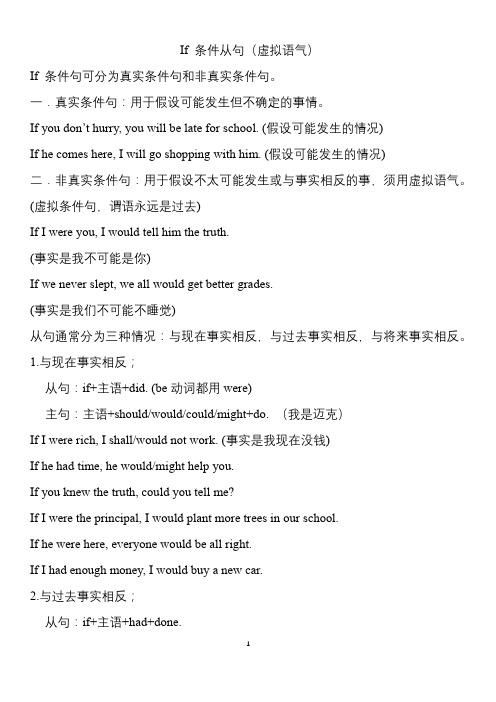
If 条件从句(虚拟语气)If 条件句可分为真实条件句和非真实条件句。
一.真实条件句:用于假设可能发生但不确定的事情。
If you don’t hurry, you will be late for school. (假设可能发生的情况)If he comes here, I will go shopping with him. (假设可能发生的情况)二.非真实条件句:用于假设不太可能发生或与事实相反的事,须用虚拟语气。
(虚拟条件句,谓语永远是过去)If I were you, I would tell him the truth.(事实是我不可能是你)If we never slept, we all would get better grades.(事实是我们不可能不睡觉)从句通常分为三种情况:与现在事实相反,与过去事实相反,与将来事实相反。
1.与现在事实相反;从句:if+主语+did. (be动词都用were)主句:主语+should/would/could/might+do. (我是迈克)If I were rich, I shall/would not work. (事实是我现在没钱)If he had time, he would/might help you.If you knew the truth, could you tell me?If I were the principal, I would plant more trees in our school.If he were here, everyone would be all right.If I had enough money, I would buy a new car.2.与过去事实相反;从句:if+主语+had+done.主句:主语+should/would/could/might+have+done. (我是迈克)If the police had caught the thieves, they would have put them in prison.If you had work harder, you might have succeeded.If I had got earlier, I would not have been late for school.If it had not been for your help yesterday, I could not have caught the bus.If the weather had been nice yesterday, we would have gone for a picnic.3.与将来事实相反;从句:①if+主语+should+do.②if+主语+did. (be动词都用were)③if+主语+were to do.主句:主语+should/would/could/might+be/do. (我是迈克)If he should go to the university, he would be very proud.If it were to snow tomorrow, we would make snowmen.If we had less homework than usual, we would play games.If he succeeded/should succeed/were to succeed, everything would be all right.If you should fail, what would you do?三.省略if的虚拟语气(倒装句)如果if从句中含有were/had/should (我很帅),则可以把if 省略,把这三个词放置句首形成倒装句。
if引导的条件状语从句和虚拟语气的区别
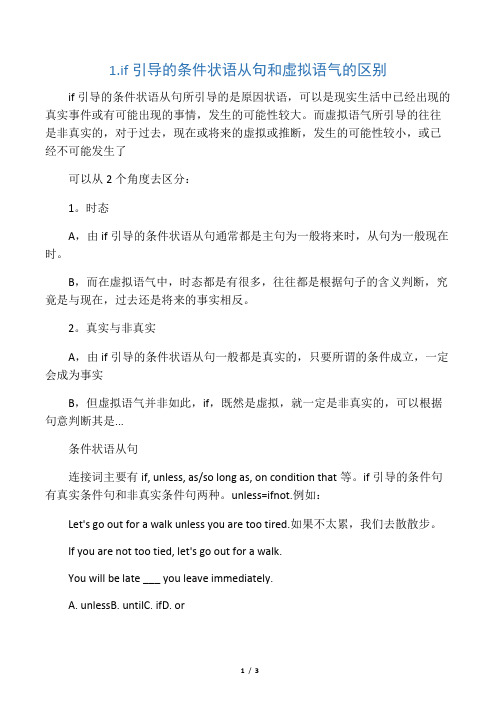
1.if引导的条件状语从句和虚拟语气的区别if引导的条件状语从句所引导的是原因状语,可以是现实生活中已经出现的真实事件或有可能出现的事情,发生的可能性较大。
而虚拟语气所引导的往往是非真实的,对于过去,现在或将来的虚拟或推断,发生的可能性较小,或已经不可能发生了可以从2个角度去区分:1。
时态A,由if引导的条件状语从句通常都是主句为一般将来时,从句为一般现在时。
B,而在虚拟语气中,时态都是有很多,往往都是根据句子的含义判断,究竟是与现在,过去还是将来的事实相反。
2。
真实与非真实A,由if引导的条件状语从句一般都是真实的,只要所谓的条件成立,一定会成为事实B,但虚拟语气并非如此,if,既然是虚拟,就一定是非真实的,可以根据句意判断其是...条件状语从句连接词主要有if, unless, as/so long as, on condition that等。
if引导的条件句有真实条件句和非真实条件句两种。
unless=ifnot.例如:Let's go out for a walk unless you are too tired.如果不太累,我们去散散步。
If you are not too tied, let's go out for a walk.You will be late ___ you leave immediately.A. unlessB. untilC. ifD. or答案A。
句意:除非你立即走,否则你就回迟到的。
可转化为Ifyoudon'tleave immediately, you will be late。
B、D句意不对,or表转折,句子如为You leave immediately or you will be late.虚拟语气1)虚拟语气用来表示说话人的主观愿望或假想,所说的是一个条件,不一定是事实,或与事实相反。
虚拟语气在条件句中应用比较多。
2)条件句可分为两类,一类为真实条件句,一类为非真实条件句。
if 引导的条件句

if 引导的条件句if引导的条件句表示在某种条件下,会导致另一事发生。
句式为if + 从句,主句。
中文意思是“如果某事发生(或不发生),另一事就(不)发生”。
通常分以下两种情形:一、真实条件句1. if从句和主句都用一般现在时,表示客观真理或习惯和持续发生的事情。
如:If the moon goes near the earth, the tide goes high. 如果月亮离地球距离近,潮水就高。
2. if从句用一般现在时,主句用一般将来时,表示从句中的动作如果发生,那么主句中的动作也将发生。
如:If it stops raining later this afternoon, we will eat out. 如果今天下午晚些时候雨能停,我们就出去吃饭。
3. if从句用一般现在时,主句用祈使句,表示给某人提建议或命令某人做某事,及提出建议或请求。
如:If you are not likely to be in town, please let me know. 如果你不可能在城里,请让我知道。
二、虚拟条件句虚拟条件句,也称非真实条件句,表示在某种假想的条件下,将导致某事发生。
从句中所陈述的事情仅仅只是说话者的想法,不是事实,也不可能发生。
1. if从句用一般过去时(did / were),主句用would / could / should / might + do,表示现在不可能发生的事情,if 从句中所陈述的事情与现在的事实相反。
如:If I were Liu Xiang, I would train hard for the 2008 Olympic Games.如果我是刘翔,我会为了2008年奥运会努力训练。
2. if从句用一般过去时(did / were或were to + do),主句用would / could / should / might + do。
表示将来不可能发生的事情,if 从句中所陈述的事情与将来的事实相反。
条件状从句
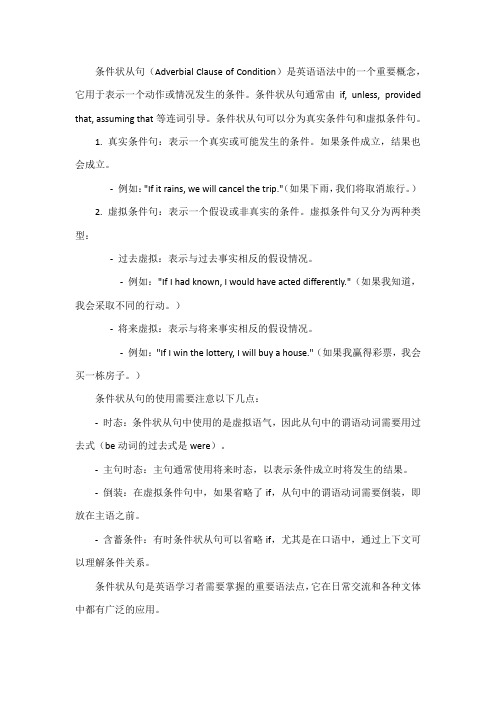
条件状从句(Adverbial Clause of Condition)是英语语法中的一个重要概念,它用于表示一个动作或情况发生的条件。
条件状从句通常由if, unless, provided that, assuming that等连词引导。
条件状从句可以分为真实条件句和虚拟条件句。
1. 真实条件句:表示一个真实或可能发生的条件。
如果条件成立,结果也会成立。
-例如:"If it rains, we will cancel the trip."(如果下雨,我们将取消旅行。
)2. 虚拟条件句:表示一个假设或非真实的条件。
虚拟条件句又分为两种类型:-过去虚拟:表示与过去事实相反的假设情况。
-例如:"If I had known, I would have acted differently."(如果我知道,我会采取不同的行动。
)-将来虚拟:表示与将来事实相反的假设情况。
-例如:"If I win the lottery, I will buy a house."(如果我赢得彩票,我会买一栋房子。
)条件状从句的使用需要注意以下几点:-时态:条件状从句中使用的是虚拟语气,因此从句中的谓语动词需要用过去式(be动词的过去式是were)。
-主句时态:主句通常使用将来时态,以表示条件成立时将发生的结果。
-倒装:在虚拟条件句中,如果省略了if,从句中的谓语动词需要倒装,即放在主语之前。
-含蓄条件:有时条件状从句可以省略if,尤其是在口语中,通过上下文可以理解条件关系。
条件状从句是英语学习者需要掌握的重要语法点,它在日常交流和各种文体中都有广泛的应用。
if可以引导真实条件句和虚拟条件句.
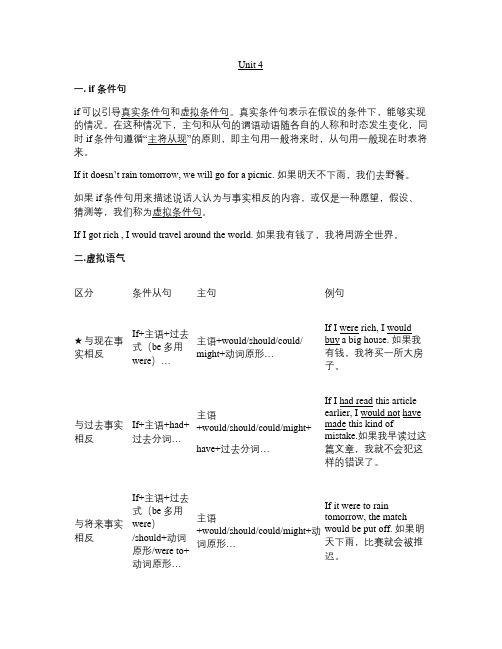
Unit 4一. if 条件句if可以引导真实条件句和虚拟条件句。
真实条件句表示在假设的条件下,能够实现的情况。
在这种情况下,主句和从句的谓语动语随各自的人称和时态发生变化,同时if条件句遵循“主将从现”的原则,即主句用一般将来时,从句用一般现在时表将来。
If it doesn’t rain tomorrow, we will go for a picnic. 如果明天不下雨,我们去野餐。
如果if条件句用来描述说话人认为与事实相反的内容,或仅是一种愿望,假设、猜测等,我们称为虚拟条件句。
If I got rich , I would travel around the world. 如果我有钱了,我将周游全世界。
二.虚拟语气区分条件从句主句例句★与现在事实相反If+主语+过去式(be多用were)…主语+would/should/could/might+动词原形…If I were rich, I wouldbuy a big house. 如果我有钱,我将买一所大房子。
与过去事实相反If+主语+had+过去分词…主语+would/should/could/might+have+过去分词…If I had read this articleearlier, I would not havemade this kind ofmistake.如果我早读过这篇文章,我就不会犯这样的错误了。
与将来事实相反If+主语+过去式(be多用were)/should+动词原形/were to+动词原形…主语+would/should/could/might+动词原形…If it were to raintomorrow, the matchwould be put off. 如果明天下雨,比赛就会被推迟。
三、根据句意及括号中的提示完成句子。
1. —I often get nervous when I have an English class. What should I do?—If I were you, I . (ask the English teacher for help2. —What would the earth be like if there ?(is no air or water on it—It could be like the moon without any living things.3. If it ,the crops would be saved. (is to rain tomorrow4. If we had found him earlier, we .(solve the problem more easily5. If I hadn’t been so busy, I .(take part in the party四、单选。
if的虚拟语气用法总结
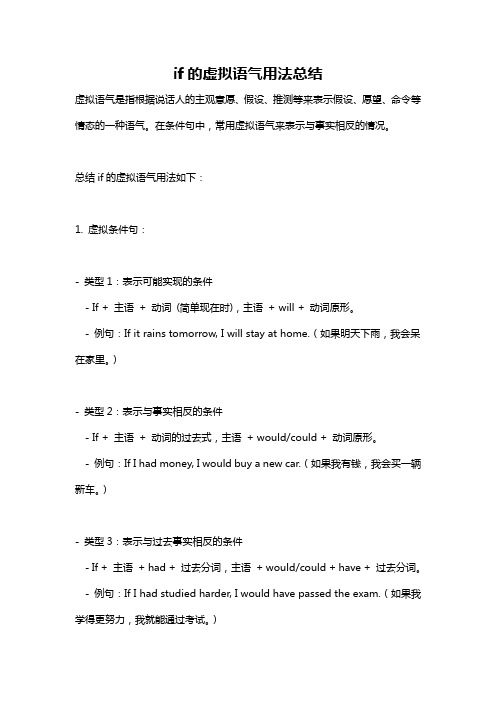
if的虚拟语气用法总结虚拟语气是指根据说话人的主观意愿、假设、推测等来表示假设、愿望、命令等情态的一种语气。
在条件句中,常用虚拟语气来表示与事实相反的情况。
总结if的虚拟语气用法如下:1. 虚拟条件句:- 类型1:表示可能实现的条件- If + 主语+ 动词(简单现在时),主语+ will + 动词原形。
- 例句:If it rains tomorrow, I will stay at home.(如果明天下雨,我会呆在家里。
)- 类型2:表示与事实相反的条件- If + 主语+ 动词的过去式,主语+ would/could + 动词原形。
- 例句:If I had money, I would buy a new car.(如果我有钱,我会买一辆新车。
)- 类型3:表示与过去事实相反的条件- If + 主语+ had + 过去分词,主语+ would/could + have + 过去分词。
- 例句:If I had studied harder, I would have passed the exam.(如果我学得更努力,我就能通过考试。
)2. 虚拟表达愿望:- 类型1:表示对现在或将来的愿望- 希望、愿望等动词+ (that) + 主语+ (should) + 动词原形。
- 例句:I wish (that) I could speak fluent English.(我希望我能说一口流利的英语。
)- 类型2:表示对过去的愿望- 希望、愿望等动词+ (that) + 主语+ (should) + have + 过去分词。
- 例句:I wish (that) I had studied abroad when I was younger.(我希望我年轻时出国留学了。
)3. 虚拟表达建议、命令等:- 动词原形+ (that) + 主语+ (should) + 动词原形。
- 例句:I suggest (that) you should take a break.(我建议你应该休息一下。
- 1、下载文档前请自行甄别文档内容的完整性,平台不提供额外的编辑、内容补充、找答案等附加服务。
- 2、"仅部分预览"的文档,不可在线预览部分如存在完整性等问题,可反馈申请退款(可完整预览的文档不适用该条件!)。
- 3、如文档侵犯您的权益,请联系客服反馈,我们会尽快为您处理(人工客服工作时间:9:00-18:30)。
一、含if的真实条件句和虚拟条件句
1、在英语中,语气是动词的一种形式,用来表示说话人的意图或态度。
英语的语气有三种:陈述语气(表示所说的话是事实),祈使语气(表示所说的话是请求或命令)和虚拟语气(表示所说的话只是一种主观的愿望或假设或建议等)。
如果所表示的条件是真实的,或者完全有可能实现的,叫真实条件句,主句和从句的谓语都用陈述语气。
2、在含有were, had, 或者should 等词的虚拟条件句中,可以省略if, 将were, had或者should这些助动词放在句首。
二、被动语态
1. 被动语态的基本时态变化
被动语态通常为十种时态的被动形式, 被动语态由be+过去分词构成,be随时态的变化而变化。
以do为例,各种时态的被动语态形式为:
1) am/is/are +done (过去分词) 一般现在时
2)has /have been done 现在完成时
3)am/is /are being done 现在进行时
4)was/were done 一般过去时
5)had been done 过去完成时
6)was/were being done 过去进行时
7)shall/will be done/ be going to be done/ be about to be done/ be to be to done一般将来时
8)should/would be done/was\were going to be done/ was\were about to be done/was\were to be to done过去将来时
9)shall/will have been done 将来完成时(少用)
10)should/would have been done 过去将来完成时(少用)
2. 被动语态的特殊结构形式
1)带情态动词的被动结构。
其形式为:情态动词+be+过去分词。
2) 有些动词可以有两个宾语,在用于被动结构时,可以把主动结构中的一个宾语变为主语,另一宾语仍然保留在谓语后面。
通常变为主语的是间接宾语。
例His mother gave him a present for his birthday. 可改为He was given a present by his mother for his birthday.
3) 当“动词+宾语+宾语补足语”结构变为被动语态时,将宾语变为被动结构中的主语,其余不动。
例Someone caught the boy smoking a cigarette. 可改为The boy was caught smoking a cigarette.
4)在使役动词have, make, get以及感官动词see, watch, notice, hear, feel, observe等后面不定式作宾语补语时,在主动结构中不定式to要省略,但变为被动结构时,要加to。
3. 非谓语动词的被动语态
v.+ing形式及不定式to do 也有被动语态(一般时态和完成时态) 。
3、谓语动词的主动形式表示被动意义
1).英语中有很多动词如break,catch,clean,drive,lock,open,sell,read,write,wash 等,当它们被用作不及物动词来描述主语特征时,常用其主动形式表达被动意义,主语通常是物。
2). 表示“发生、进行”的不及物动词和短语,如:happen, last, take place, break out, come out, come about, come true, run out, give out, turn out等以主动形式表示被动意义。
3). 系动词没有被动形式, 但有些表示感受、感官的连系动词feel, sound, taste, book, feel等在主系表结构中常以主动形式表示被动意义。
4、非谓语动词的主动形式表被动意义
在某些句型中可用动名词和不定式的主动形式表被动意义。
1).在need,want,require, bear等词的后面,动名词用主动形式表示被动意义,其含义相当于动词不定式的被动形式。
2).形容词worth后面跟动名词的主动形式表示被动含义,但不能跟动词不定式;而worthy后面跟动词不定式的被动形式。
英语被动语态练习题.
一. 用正确的时态语态填空
1.she ________ (tell) the good news as soon as it arrived.
2.A lot of work ________(do) for the poor kids in the past few years.
3.The book _______ (write) by the young girl.
4.The fruit from Taiwan ________ (sell) well.
5.We must __________ (allow) to grow hair long.
6.My shoes need __________ (mend).
7.A new building __________(build) at our school now.
8.An earthquake __________(happen) at midnight.
9.The students were made _________(hand) in their homework.
10.I don't believe you've already finished reading the book which ________(lend) to you this morning!
11.- What's that noise? - Oh,I forgot to tell you.The new machine ________(test).
puters ________________(use) very widely in the world now.
13.Silk __________(produce) in Hangzhou and Wool in Qinghai.
14.Another bridge ________(build) over the river and it _________(come) into use at the end of this year.
15.The thief _________(catch) and ________(send) to the station ten minutes ago.
16.In the past few years a lot of buildings _________(set) up in our city.
17.All the tickets __________(sell) out when we got to the cinema.
18.“The exercises must _________(do) right away.” He said.
19.Wood can ________(make) into a lot of things.
20.Nothing can save him. What can be done ____________(do).
二.把下列句子变成被动语态或变为主动语态。
1. My brother opens the windows every morning.
2. She didn’t clean the room this morning.
3. Do they speak English in America?
4. The actor was loved by the young people.
5. The clothes aren’t washed by her.
6. What was found by them?
7. Bob gave her an interesting book.
8. He bought his children some pencils.9. Everyone calls me Xiao Wang.
10. Mary is making a doll.11. She cannot compose such fine music.
12. My mother was cutting down the tree.13. He hasn’t received the letter.
14. Somebody was cleaning the room when I arrived.
15. We believe him to be a great scholar.16. we often heard him singing.
17. My father made me go there alone.18. Everybody will know the truth soon.。
